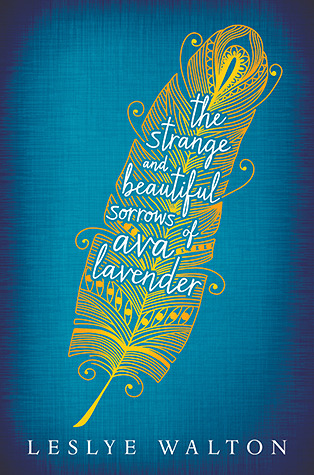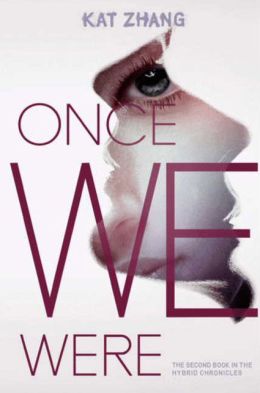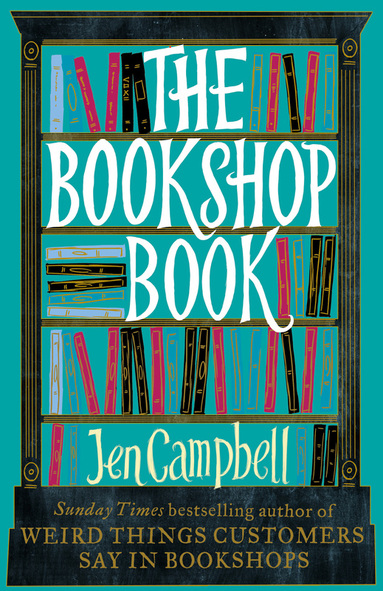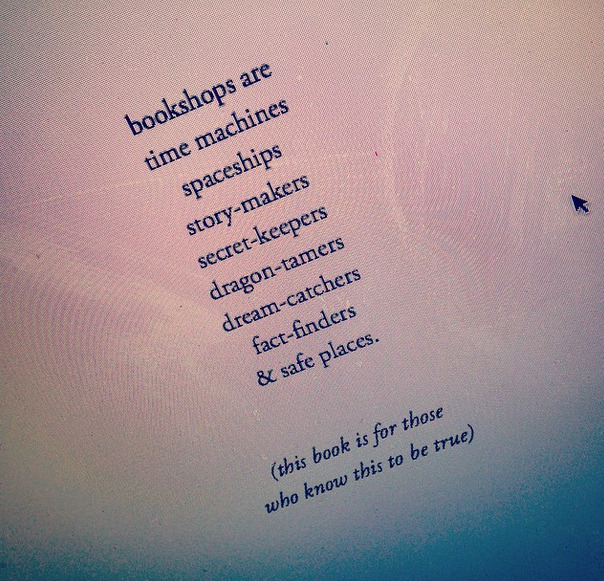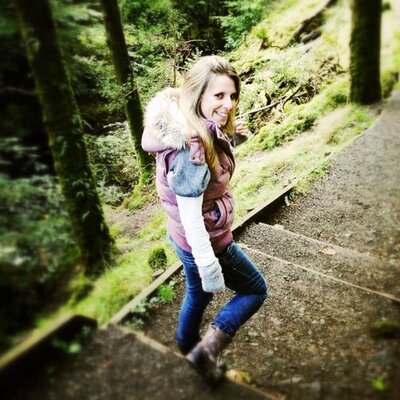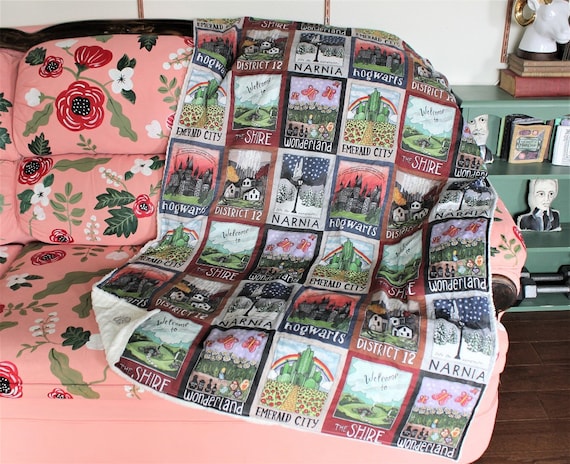If you’re a regular visitor around these parts (or follow me
on Twitter) then you’ll likely be aware that I have been extraordinarily
excited about Jen Campbell’s marvellous new book ‘The
Bookshop Book’ – released yesterday and published by Constable (Little, Brown).
The official book for the Books Are My Bag
campaign, The Bookshop Book is a love letter to
books and bookshops the world over:
Every bookshop has a story.
We’re not talking about rooms that are just full of books. We’re talking about
bookshops in barns, disused factories, converted churches and underground car
parks. Bookshops on boats, on buses, and in old run-down train stations.
Fold-out bookshops, undercover bookshops,
this-is-the-best-place-I’ve-ever-been-to-bookshops.
Meet Sarah and her Book Barge sailing across the sea to France. Meet
Sebastien, in Mongolia, who
sells books to herders of the Altai mountains.
Meet the bookshop in Canada
that’s invented the world’s first antiquarian book vending machine.
And that’s just the beginning.
From the oldest bookshop in the world, to the smallest you could imagine, The Bookshop Book examines the history of books,
talks to authors about their favourite places, and looks at over three hundred
weirdly wonderful bookshops across six continents (sadly, we’ve yet to build a
bookshop down in the South Pole).
authors involved in the book include Brian Aldiss, David
Almond, Bill Bryson, Tracy Chevalier, Cornelia Funke, Audrey Niffenegger, Ian
Rankin, Jacqueline Wilson and more.
Jen, who graduated from Edinburgh University
with an MA in English Literature and now lives and works in London, is not only an all round ‘lovely
person’ (and one of my faves) but also an award winning poet and short story
writer. Her first book, Weird Things Customers Say in Bookshops was a Sunday Times
bestseller. She’s dropped by my little corner of the blogosphere today to chat
about All Things Bookshop. So, make a coffee, grab a slice of cake and pull up
a seat.
Jen! Thank-you for
stopping by. Quickly quickly, before we
start – let’s get warmed up with a quick fire round!
Coffee, tea or…?
Tea. Always tea.
English breakfast. Earl Grey. Lady
Grey. Or Teapig’s Winter Red Tea. Thanks.
Favourite Film?
Shakespeare in Love or Spirited Away
Favourite book?
Through the Looking Glass - Lewis
Carroll (I can’t believe you made me choose!) (Jo: sorry
not sorry!)
Summer or winter?
Winter! (Though preferably autumn.
Boots and cardigans and log fires, yes please.)
Favourite Colour?
Mint green.
Last thing you ate?
Marmite on toast. (Jo: this is why I like you so much – your excellent food choices.)
Favourite holiday
destination?
Somewhere windswept by the sea.
Ok, and now that’s
done, onto the nitty gritty!
Where did the idea for
the bookshop book come from?
I think it was born out of my
‘Bookshop Spotlights’ blog posts that I started in 2012, featuring bookshops I
really liked. But really it was fueled after ‘Weird Things...’ was published
and I spent a lot of time doing events in wonderful bookshops and talking to
inspiring booksellers. I’d written about the weird things that happen to
booksellers, but I hadn’t written about the magical feeling of bookshops and
how books affect people. I hadn’t spoken about the history and wonder of
‘houses for stories’ (which is what one of my youngest customers calls
bookshops, and I love it.) My editor said: ‘Think about how you would write
about that. How you’d capture it. Then send me something.’ So I did.
What is your earliest
bookshop memory?
We didn’t have independent bookshops
where I grew up, we just had a Waterstones. I think that’s why I fell for
bookshops so hard when I moved to Edinburgh
to do my degree. Suddenly there was so much to explore, and so many books to
lose myself in. Oh and the smell. I’ll never forget the smell of Till’s
bookshop in Edinburgh.
The smell of vanilla and dust and stories from long ago.
Tell us about the best
bookshop you've visited?
Oh, no. I can’t do that. I’ve
answered the question about my favourite book, and that was painful enough! ;)
(Jo: hmmmm, ok. I shall let you off. This time.)
And the one that your
research has you dream-planning a visit to?
If time and money were
no object what would your perfect bookshop be like?
It would be a bit of a labyrinth.
Maybe even an actual maze. A treasure hunt for books. I’d have it in the middle
of a forest, with fairy lights everywhere.
The Bookshop Book is
more than just your love letter to bookshops everywhere; it's that of
booksellers and writers too. When gathering your research which book selling
story made your heart sing? Feel free to give us a snippet
I love the history of Shakespeare
and Co in Paris,
and how its original owner Sylvia Beach stood up to the Nazis, refusing to
serve them so that they threatened to burn her shop to the ground. I love Sarah
Henshaw, who runs a bookshop on a narrowboat in the UK and is planning to
bravely/crazily cross the Channel in it. I love that there’s a bookshop in Kenya that also
sells cows. I love Fjaerland in Norway,
which is a Book Town
near the largest glacier in mainland Europe.
It has bookshops in old buildings and sheds, and in the winter the booksellers
use kick-sleds to transport books across the snow. I love... oh, I really could
go on forever. You’re just going to have to read it.
I'm going to be
reading every word, naturally, but the minute I open it, which author interview
should I skip to first: which sticks on your mind, and how did it feel to sit
down and talk books with people whose work you love?
It was overwhelming, and I was so
amazed that so many wonderful authors were willing to speak to me. Every author
I spoke to was so passionate about books and reading (but then, I would hope
they would be!). I can’t pick out one interview over another, but one moment I
remember vividly is this. I met up with Audrey Niffenegger when she was in London and we had tea and
cake and talked about our favourite places. She was describing Roger, a
bookseller who she cares about deeply, who ran a bookshop in Chicago called Bookman’s Alley. She was
talking about the souls of bookshops, and how she’s written about it in her
graphic novel Library series: about these wonderful characters who come to a
bookshop that’s closing down and collect its soul so that it can live on
forever. And as she was speaking about that, and about Roger closing down his
bookshop due to ill-health and how she wants to capture him in the stories she
writes... I realised that she was crying. And it hit me full on, this
realisation - which I did already know but had perhaps forgotten slightly - of
the ties that bind us not only to the people we care about, but also to
literature and the people who protect it with us. Of our need to tell stories,
and share them so that they become part of our history - in the hope that the
people and places we write about can live on and on, and never disappear.
I am in LOVE with the
cover art. Tell us about how that came to be?
The Bookshop Book was
a mammoth task and one that you should be proud of, how different was it to
Weird Things?
Oh, so very different! ‘Weird
Things...’ were books recording things I’ve heard and things I’ve said... it
was a case of going through notes and sorting through memories. The Bookshop
Book required massive amounts of research (though all of it rewarding) and it’s
eight times the size of ‘Weird Things...’, word-count-wise, too. It’s a whole
new beast.
What has been the best
and worst thing about the whole experience?
Tell us about how you write?
Is the room quiet or do you play music? Do you like your dog at your feet? What
works best?
What’s the oddest
thing on your desk?
Nothing odd on my desk, I’m afraid.
Just my computer and my phone. (And a half-eaten Crunchie bar, yum.) (Jo: I have Sebastian from The Little Mermaid on my desk. & a
triangular highlighter that is almost impossible to use….)
What's next for you?
The novel. It’s eating my soul. I
like it. (Jo: *happy dance*)
What authors have
caught your interest lately, and why?
What do you wish you
got asked in these interviews, but never do?
And because I always
want to know the answer to this: what are you reading right now?
Elizabeth
is Missing by Emma Healey, Black Moon by Kenneth Calhoun and Black
Country by Liz Berry.
If you’d like a signed copy of The Bookshop Book
then you can order one directly from Jen, over here. You can also find her hanging out at various
places on the internet:
